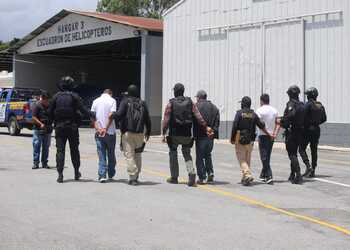United States Suddenly Keen to Extradite Guatemala’s Human Smugglers – InSight Crime

An unusual US request has led Guatemalan authorities to dismantle a prolific ring that smuggled migrants to the United States, underscoring Washington's focus on reducing irregular migration by arresting its facilitators.
An operation in early August saw Guatemalan police detain 19 alleged members of a group known as Alfa Siete. The gang generated nearly $2 million from helping smuggle migrants between Guatemala and the United States, according to a press release from the country's Interior Ministry.
However, the Alfa Siete group was seemingly mislabelled as being involved in “human trafficking,” a crime involving forcibly moving people against their will, as opposed to “human smuggling,” where people pay criminal gangs to help them cross international borders.
US prosecutors are seeking the extradition of four figures within the Alfa Siete gang. All of them are charged with conspiring to facilitate the travel of large numbers of migrants from Guatemala to the United States between August 2019 and April 2022, according to indictments unsealed by the US Justice Department (DOJ).
SEE ALSO: Reliance on Human Smugglers Continues to Kill Migrants at US-Mexico Border
The four are also held responsible for the accidental death of a female Guatemalan migrant in Texas in April 2021. After paying the smugglers nearly $10,000 to get to the United States, the female migrant died during a multi-day desert crossing.
Such exorbitant fees are ever more common. Tighter US controls are now driving migrants into paying $2,000-$7,000 for smuggling services from Mexico into the United States, with supposedly safer routes being advertised for several times that price, reported Reuters on August 1.
Alfa Siete itself would levy up to $10,000-12,000 to take people from Guatemala into Mexico and across the US border, according to the DOJ.
InSight Crime Analysis
US extraditions of human smugglers in Latin America have historically been rare, but they have been increasing in line with record migration flows – and deaths – in US-Mexico border areas.
“The Biden administration has made prosecutions of human smugglers a specific priority, establishing a National Action Plan, the DOJ's new ‘Joint Task Force Alpha,' and an Interagency Task Force running out of the White House,” said Adam Isacson, Director for Defense Oversight at the Washington Office on Latin America (WOLA).
In this vein, certain US officials have conflated human trafficking, which exploits unwilling people, and human smuggling, which provides an agreed upon service. Others are aggressively pushing the message that migrant deaths are the result of ruthless human smugglers.
SEE ALSO: Mexico Migrant Massacre Linked to Sophisticated Guatemala Smuggling Ring
The latter contains some truth. Since around 2019, human smuggling from Mexico to the United States has morphed from an informal, freelance business into a highly-organized criminal economy worth up to $13 billion per year, according to a recent article by the New York Times.
In the frontier state of Tamaulipas, the New York Times found that factions of the Gulf Cartel (Cartel del Golfo) and the Zetas have now moved from just taxing coyotes (a slang term for human smugglers) to running their own smuggling operations.
Migrant smuggling in western Guatemala likewise appears to have become both more sophisticated and profitable, operated by politically-connected family clans who launder proceeds and have previously threatened migrants' families.
But a focus on prosecuting smugglers is unlikely to make any real difference to the numbers of migrants heading to the United States. In contrast, the US government's failure to reverse Title 42, a Trump-era policy that immediately expels asylum seekers, continues to dramatically constrain legal relocation pathways. This has led to ever more migrants seeking out smugglers' services.
This “Eyes on Trafficking” story is reprinted from its original online location.
 ABOUT PBJ LEARNING
ABOUT PBJ LEARNING
PBJ Learning is a leading provider of online human trafficking training, focusing on awareness and prevention education. Their interactive Human Trafficking Essentials online course is used worldwide to educate professionals and individuals how to recognize human trafficking and how to respond to potential victims. Learn on any web browser (even your mobile phone) at any time.
More stories like this can be found in your PBJ Learning Knowledge Vault.
EYES ON TRAFFICKING
This “Eyes on Trafficking” story is reprinted from its original online location.
ABOUT PBJ LEARNING
PBJ Learning is a leading provider of online human trafficking training, focusing on awareness and prevention education. Their interactive Human Trafficking Essentials online course is used worldwide to educate professionals and individuals how to recognize human trafficking and how to respond to potential victims. Learn on any web browser (even your mobile phone) at any time.
More stories like this can be found in your PBJ Learning Knowledge Vault.
